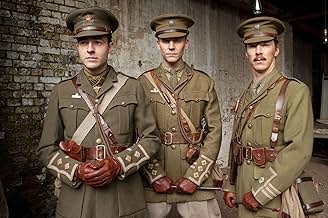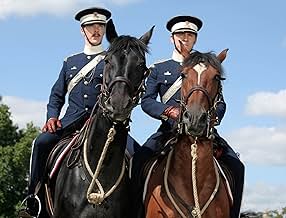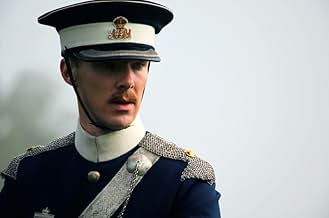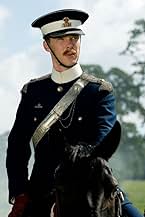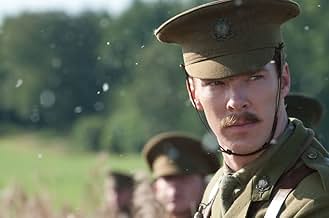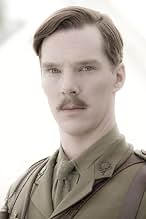A young farm boy enlists to serve in World War I after his beloved horse is sold to the cavalry. His hopeful journey takes him out of England and onto the front lines as the war rages on.A young farm boy enlists to serve in World War I after his beloved horse is sold to the cavalry. His hopeful journey takes him out of England and onto the front lines as the war rages on.A young farm boy enlists to serve in World War I after his beloved horse is sold to the cavalry. His hopeful journey takes him out of England and onto the front lines as the war rages on.
- Nominated for 6 Oscars
- 15 wins & 76 nominations total
Featured reviews
I was lucky enough to see War Horse in a special pre-screening last week, and I can safely say I will be seeing it again when its released on Christmas day. I went in with relatively low expectations, after watching the series of mediocre trailers, and walked out being able to safely say that War Horse is one of the best movies of the year, one of Steven Spielberg's best films, and, quite possibly, one of the best war films ever made, up there with my personal favorites The Thin Red Line, Apocalypse Now and Paths of Glory.
Steven Spielberg had long said that he didn't want to make Saving Private Ryan again. He said he wanted War Horse to be a war movie that parents cant take their children to and teach them something about love and war, and in this respect I can say that he more than succeeded. Spielberg comes close to the clinical perfection of Private Ryan, but more importantly, from an emotional perspective, War Horse far exceeds Private Ryan. There are many people apt to cry at Private Ryan, but War Horse is more likely to cause tears at a similar level to, say, Schindler's List. More importantly, unlike either Schindler or Private Ryan, War Horse is unlikely to cause any sort of political or moral complaints. He never tempers the anti-war message with nationalist tripe. Rather, he plays war straight. War is evil, men are good. There are no sides in this movie. In fact, at various points throughout the film, he seems to directly reject Saving Private 's heroism is dying for country message.
War Horse is based on the children's book and play of the same name. It is about a boy who's father, on a whim, buys a horse for his son that he knows will never be what is needed for the farm work it is purchased for. The boy forms an incredible bond with the horse. The first forty five minutes of the film is spent establishing the relationship between boy and horse. This part of the film is rather slow, but is necessary to establishing the film's central relationships, and is quickly made up for by the shift in pace as soon as the war begins. From the Scottish country side, after this important turning point in world history, War Horse shifts to France, where the titular horse is serving after being sold to the army. The boy is a year or two too young to follow his horse to Europe at this point, so for the next section, the film follows the horse only. From here on out, I will leave the plot a mystery, but it is gripping, thrilling, and very emotional.
There are two scenes in War Horse that I think are worthy of further mention. The first is a charge across no man's land. For anyone not familiar with the bulk of World War I's combat, it consisted of months at a time of back and forth shooting between trenches, broken up by awful charges across no man's land, to take a few hundred yards of enemy territory. These charges, as short as they were, as a result of the machine gun, came with death tolls in the thousands or higher. War Horse contains one of these charges, and it is carried out with both taste, and near perfect artistry. It is just grisly enough to get the reality across, but not so grisly that it makes the movie impossible to show to younger audiences. In fact, this trench charge ranks up with Steven Spielberg's other famous World War battle scene, the beach landing in Saving Private Ryan. It doesn't quite make it, but it comes close.
The other scene worthy of mention also occurs in the trenches, and reflects the other side of War Horse. The titular horse gets caught in the barbed wire in No Man's Land. The soldiers on either side spot it. No one knows what to do, as it is clear that its in incredible pain, but they know that leaving their respective trench would expose them to machine gun fire. Eventually two soldiers, one British, the other German both move to free the horse. The soldiers on both sides know what is going on, so no one fires a shot. This scene is unbelievably touching. The discussion they have (the German soldier happens to speak good English, explained adequately through a joke) will move even the most cynical of viewers, and gives a good idea of just what perspective War Horse takes to the act of war.
There are a few small problems in War Horse that, in most films, I would take issue with, but I will forgive in this case as I feel that they are so necessary for this film to appeal to younger audiences. The German soldiers speak English to one another, a big pet peeve for me. I would have preferred for French characters to speak subtitled French and German characters to speak subtitled Germans, but I recognize that many younger viewers refuse to read subtitles. There are a few unnecessary jokes, but again, younger viewers will enjoy these. Spielberg, as always, has three different endings tacked onto the movie, in this case necessary to provide the cut and dry resolution younger viewers require. As I said, these are still problems, but they are, for better or worse, required to accomplish what Spielberg was trying to.
I can say with absolute certainty that when Christmas rolls around, I will be dragging all my younger relatives to a screening of War Horse. I have never seen a movie so able to pull its punches enough to get a PG- 13 rating, but show enough to explain just what it is about war that makes it such an odious, disgusting, awful affair. In short, see War Horse as soon as you possibly can.
Steven Spielberg had long said that he didn't want to make Saving Private Ryan again. He said he wanted War Horse to be a war movie that parents cant take their children to and teach them something about love and war, and in this respect I can say that he more than succeeded. Spielberg comes close to the clinical perfection of Private Ryan, but more importantly, from an emotional perspective, War Horse far exceeds Private Ryan. There are many people apt to cry at Private Ryan, but War Horse is more likely to cause tears at a similar level to, say, Schindler's List. More importantly, unlike either Schindler or Private Ryan, War Horse is unlikely to cause any sort of political or moral complaints. He never tempers the anti-war message with nationalist tripe. Rather, he plays war straight. War is evil, men are good. There are no sides in this movie. In fact, at various points throughout the film, he seems to directly reject Saving Private 's heroism is dying for country message.
War Horse is based on the children's book and play of the same name. It is about a boy who's father, on a whim, buys a horse for his son that he knows will never be what is needed for the farm work it is purchased for. The boy forms an incredible bond with the horse. The first forty five minutes of the film is spent establishing the relationship between boy and horse. This part of the film is rather slow, but is necessary to establishing the film's central relationships, and is quickly made up for by the shift in pace as soon as the war begins. From the Scottish country side, after this important turning point in world history, War Horse shifts to France, where the titular horse is serving after being sold to the army. The boy is a year or two too young to follow his horse to Europe at this point, so for the next section, the film follows the horse only. From here on out, I will leave the plot a mystery, but it is gripping, thrilling, and very emotional.
There are two scenes in War Horse that I think are worthy of further mention. The first is a charge across no man's land. For anyone not familiar with the bulk of World War I's combat, it consisted of months at a time of back and forth shooting between trenches, broken up by awful charges across no man's land, to take a few hundred yards of enemy territory. These charges, as short as they were, as a result of the machine gun, came with death tolls in the thousands or higher. War Horse contains one of these charges, and it is carried out with both taste, and near perfect artistry. It is just grisly enough to get the reality across, but not so grisly that it makes the movie impossible to show to younger audiences. In fact, this trench charge ranks up with Steven Spielberg's other famous World War battle scene, the beach landing in Saving Private Ryan. It doesn't quite make it, but it comes close.
The other scene worthy of mention also occurs in the trenches, and reflects the other side of War Horse. The titular horse gets caught in the barbed wire in No Man's Land. The soldiers on either side spot it. No one knows what to do, as it is clear that its in incredible pain, but they know that leaving their respective trench would expose them to machine gun fire. Eventually two soldiers, one British, the other German both move to free the horse. The soldiers on both sides know what is going on, so no one fires a shot. This scene is unbelievably touching. The discussion they have (the German soldier happens to speak good English, explained adequately through a joke) will move even the most cynical of viewers, and gives a good idea of just what perspective War Horse takes to the act of war.
There are a few small problems in War Horse that, in most films, I would take issue with, but I will forgive in this case as I feel that they are so necessary for this film to appeal to younger audiences. The German soldiers speak English to one another, a big pet peeve for me. I would have preferred for French characters to speak subtitled French and German characters to speak subtitled Germans, but I recognize that many younger viewers refuse to read subtitles. There are a few unnecessary jokes, but again, younger viewers will enjoy these. Spielberg, as always, has three different endings tacked onto the movie, in this case necessary to provide the cut and dry resolution younger viewers require. As I said, these are still problems, but they are, for better or worse, required to accomplish what Spielberg was trying to.
I can say with absolute certainty that when Christmas rolls around, I will be dragging all my younger relatives to a screening of War Horse. I have never seen a movie so able to pull its punches enough to get a PG- 13 rating, but show enough to explain just what it is about war that makes it such an odious, disgusting, awful affair. In short, see War Horse as soon as you possibly can.
I went to see this movie expecting NOT to like it. But, for 2 hours and 15 mins I was totally enthralled. I don't understand the reviews that have disliked this wonderful movie. If you want a cinematic experience this will tick the boxes. This is simply a great story - well told. Its also visually stunning. There's no stupid CGI. There's no gratuitous violence - the violent moments are tastefully choreographed and at times heartbreakingly realistic - without going for sensationalism. I'll not tell you the story or give any spoilers. Except to say this. Girls - bring hankies! Guys - don't be put off by the hankies - there's plenty of good action and the story is brilliant anyway. If you want a normal brainless CGI blockbuster - look elsewhere. If you want a class GREAT MOVIE GO AND SEE WARHORSE - you will not regret it.
It is well understood from the first few scenes that the typical cliché of both war films and animal dramas will stain Spielberg's canvas, yet the film pushes forward, earning well-deserved praise. Quite a few scenes are captivating to say the least; as is the scene with the horse, Joey, forging through heavily barb-wired no man's land.
'War Horse' surely reminisces the older WW1 films, and epic war films in general, such as Lawrence of Arabia, that drag on forever, yet do not fail to keep you enthralled with their stunning visuals and top-notch acting. Jeremy Irvine's performance was acceptable for an actor fairly new to the game, as were the performances of the gamut of child actors in the film, but honorable mentions must go to Emily Watson, Niels Arestrup, and Peter Mullan. The production did a wonderful job to give the horse Joey a deeper personified image, as if he were an actor. The same goes for the other horses in the film, who seem to converse amongst each other and reveal a chemistry shared between animal and animal, as well as animal and man. A wonderful job on the whole. Certainly Spielberg's finest work in recent months (yes, I don't think cowboys and aliens should ever mix).
For what its worth, this picture will move you deeply, as it has done to many. 'War Horse' inspires anti-war sentiments, as Joey's endeavors help him sympathize with men on both sides of the trenches, and ultimately reminds us of the beauty of Earths beasts. Each one has its own character that strikes a chord with the audience, and this is undeniable.
Enjoy!
'War Horse' surely reminisces the older WW1 films, and epic war films in general, such as Lawrence of Arabia, that drag on forever, yet do not fail to keep you enthralled with their stunning visuals and top-notch acting. Jeremy Irvine's performance was acceptable for an actor fairly new to the game, as were the performances of the gamut of child actors in the film, but honorable mentions must go to Emily Watson, Niels Arestrup, and Peter Mullan. The production did a wonderful job to give the horse Joey a deeper personified image, as if he were an actor. The same goes for the other horses in the film, who seem to converse amongst each other and reveal a chemistry shared between animal and animal, as well as animal and man. A wonderful job on the whole. Certainly Spielberg's finest work in recent months (yes, I don't think cowboys and aliens should ever mix).
For what its worth, this picture will move you deeply, as it has done to many. 'War Horse' inspires anti-war sentiments, as Joey's endeavors help him sympathize with men on both sides of the trenches, and ultimately reminds us of the beauty of Earths beasts. Each one has its own character that strikes a chord with the audience, and this is undeniable.
Enjoy!
World War II has been put to film a number of times in many different countries, but there are not nearly enough World War I films. Steven Spielberg set out to redress the balance giving us War Horse, an adaptation of a children's book and the play of the same name.
Albert Narracott (Jeremy Irvine) is a young man living in Dartmoor in 1914. His father (Peter Mullan) buys a thoroughbred horse when he should have plough because of his rift with his landlord (David Thewlis). Albert is able to break in the horse who he names Joey and he shows to be a very special horse, strong, determined, loyal and intelligence. But when World War I breaks out, Joey is sold to a British office, Captain Nicholls (Tom Hiddleston) and during the course of the conflict the horse see all aspects, from a Calvary horse, in rural civilian life for a French girl suffering Hollywood's disease (i.e. they say she is dying but seems perfectly healthy), as a German work horse and in no man's land.
Spielberg has a good track record making historical films with Schindler's List, Saving Private Ryan and Empire of the Sun. War Horse is a solid film rather then being a great film. It is a film that is rich in period detail, showing the brutal nature of World War I, from the effects of chemical warfare and you feel the muddy, dirty environment as horses pull a giant artillery battery up a hill and Spielberg knows how to make a mundane scene of a horse ploughing a field exciting and emotional (it must be the most boring village in the world for watching a horse ploughing to be considered entertainment). But at the same time there are also some problems, particularly Spielberg's reliance on cutesy humour, from a goose who chases people to a scene in the trenches. I would not be surprise if Richard Curtis was partially responsible. The film is too long and many scenes could have been shorten or cut, particularly in the beginning. I think the relationship and love between Albert and Joey could have easily have been done in half the time.
It was a great idea of using a horse to show the horrors of war and the different perspectives of war. It is a great opportunity to show that they are good guys and bad guys on both sides of the war. There is some success in that in the German army privates are show to be decent caring people to the horse, but the officer core and sergeants were very harsh and cruel. Compare it to the British officers who are noble, if a little arrogant or cocky, but there are hints in one of the officers that behind his eagerness that in reality he was scared of the prospect of going to war for the first time. I would have wanted to see more of a mixed picture within all sides of the war and try to give more depth to the characters.
There is a great cast in War Horse, we have emerging talent like Hiddleston and Benedict Cumberbatch who in their small roles show they are going to be big actors (well more so), new talent like Irvine who was excellent, playing his character like Sam and Frodo from Lord of the Rings and Celine Buckens where the humour works best. Emily Watson was also brilliant as Albert's mother and it great to see in a big film. And of course Joey the horse shows a lot of promise as an animal performer.
John Williams also supplies Mr. Spielberg with another great score, fitting for the film and Janusz Kaminski continues with great camera work, from the bright work of Devon in the summer to more grey and dull view of the front line of the war.
War Horse is a solid piece of filmmaking. It is typical Oscar bait but it still works as a film and Spielberg is able to make us care for Joey.
7.5/10.
Albert Narracott (Jeremy Irvine) is a young man living in Dartmoor in 1914. His father (Peter Mullan) buys a thoroughbred horse when he should have plough because of his rift with his landlord (David Thewlis). Albert is able to break in the horse who he names Joey and he shows to be a very special horse, strong, determined, loyal and intelligence. But when World War I breaks out, Joey is sold to a British office, Captain Nicholls (Tom Hiddleston) and during the course of the conflict the horse see all aspects, from a Calvary horse, in rural civilian life for a French girl suffering Hollywood's disease (i.e. they say she is dying but seems perfectly healthy), as a German work horse and in no man's land.
Spielberg has a good track record making historical films with Schindler's List, Saving Private Ryan and Empire of the Sun. War Horse is a solid film rather then being a great film. It is a film that is rich in period detail, showing the brutal nature of World War I, from the effects of chemical warfare and you feel the muddy, dirty environment as horses pull a giant artillery battery up a hill and Spielberg knows how to make a mundane scene of a horse ploughing a field exciting and emotional (it must be the most boring village in the world for watching a horse ploughing to be considered entertainment). But at the same time there are also some problems, particularly Spielberg's reliance on cutesy humour, from a goose who chases people to a scene in the trenches. I would not be surprise if Richard Curtis was partially responsible. The film is too long and many scenes could have been shorten or cut, particularly in the beginning. I think the relationship and love between Albert and Joey could have easily have been done in half the time.
It was a great idea of using a horse to show the horrors of war and the different perspectives of war. It is a great opportunity to show that they are good guys and bad guys on both sides of the war. There is some success in that in the German army privates are show to be decent caring people to the horse, but the officer core and sergeants were very harsh and cruel. Compare it to the British officers who are noble, if a little arrogant or cocky, but there are hints in one of the officers that behind his eagerness that in reality he was scared of the prospect of going to war for the first time. I would have wanted to see more of a mixed picture within all sides of the war and try to give more depth to the characters.
There is a great cast in War Horse, we have emerging talent like Hiddleston and Benedict Cumberbatch who in their small roles show they are going to be big actors (well more so), new talent like Irvine who was excellent, playing his character like Sam and Frodo from Lord of the Rings and Celine Buckens where the humour works best. Emily Watson was also brilliant as Albert's mother and it great to see in a big film. And of course Joey the horse shows a lot of promise as an animal performer.
John Williams also supplies Mr. Spielberg with another great score, fitting for the film and Janusz Kaminski continues with great camera work, from the bright work of Devon in the summer to more grey and dull view of the front line of the war.
War Horse is a solid piece of filmmaking. It is typical Oscar bait but it still works as a film and Spielberg is able to make us care for Joey.
7.5/10.
Spielberg's film is his vision of Michael Morpurgo's beloved book, which must surely now be essential reading for all kids, if it wasn't before.
Superficially it's about a horse named Joey and a boy called Albert, who become inseparable through a series of unfortunate events – World War I being one of them. A closer look reveals a story of such overwhelming humanity that I was bowled over. Spielberg was the only director for this film because he knows what it means to be a child.
Whether or not it is apparent in the book, there's no doubt this is a war film, one that ranks with Spielberg's 'Saving Private Ryan' and 'Schindler's List'. Emily Watson's character utters a line about the refusal of being proud of killing, which is the line one might use to summarise the film's point. Because Spielberg is Jewish, this line is pregnant with meaning. It's his noble way of saying that, despite the suffering received by his kin, he is willing to forgive their oppressors.
There's a scene where Joey is trapped by barbed-wire in no man's land and is freed by the combined effort of an Englishman and a German, who put aside their differences under the name of human decency. The scene is breathtaking, and it's the sort which no-one does better than Spielberg.
Long-time collaborator John Williams provides a moving score, regardless of its resemblance to the one he composed for 'Saving Private Ryan'. Director of Photography Janusz Kaminski reminds us of the beauty of our rural regions by photographing the Devonshire countryside with reverence.
Jeremy Irvine, Peter Mullan, David Thewlis, Benedict Cumberbatch, Niels Arestrup and Tom Hiddleston form the principal cast and are wonderful. Nothing could have prepared me for how much I'd be moved. There's no reason why you won't be.
moseleyb13.com
Superficially it's about a horse named Joey and a boy called Albert, who become inseparable through a series of unfortunate events – World War I being one of them. A closer look reveals a story of such overwhelming humanity that I was bowled over. Spielberg was the only director for this film because he knows what it means to be a child.
Whether or not it is apparent in the book, there's no doubt this is a war film, one that ranks with Spielberg's 'Saving Private Ryan' and 'Schindler's List'. Emily Watson's character utters a line about the refusal of being proud of killing, which is the line one might use to summarise the film's point. Because Spielberg is Jewish, this line is pregnant with meaning. It's his noble way of saying that, despite the suffering received by his kin, he is willing to forgive their oppressors.
There's a scene where Joey is trapped by barbed-wire in no man's land and is freed by the combined effort of an Englishman and a German, who put aside their differences under the name of human decency. The scene is breathtaking, and it's the sort which no-one does better than Spielberg.
Long-time collaborator John Williams provides a moving score, regardless of its resemblance to the one he composed for 'Saving Private Ryan'. Director of Photography Janusz Kaminski reminds us of the beauty of our rural regions by photographing the Devonshire countryside with reverence.
Jeremy Irvine, Peter Mullan, David Thewlis, Benedict Cumberbatch, Niels Arestrup and Tom Hiddleston form the principal cast and are wonderful. Nothing could have prepared me for how much I'd be moved. There's no reason why you won't be.
moseleyb13.com
Did you know
- TriviaDirector Steven Spielberg stated that the only digital effects used in the movie were three shots that lasted three seconds, and it was done to ensure the safety of the horse involved. Spielberg was quoted as saying, "That's the thing I'm most proud of. Everything you see on screen really happened."
- GoofsCaptain Nicholls is shown completely clean-shaven in 1914. In reality, British Army officers were not permitted to shave their upper lips until 1916.
- Quotes
Albert Narracott: We'll be alright Joey. We're the lucky ones, you and me. Lucky since the day I met you.
- ConnectionsFeatured in Breakfast: Episode dated 26 October 2011 (2011)
- SoundtracksThe Scarlet and the Blue
By John Tams and Adrian Sutton
- How long is War Horse?Powered by Alexa
Details
- Release date
- Countries of origin
- Official sites
- Languages
- Also known as
- Caballo de guerra
- Filming locations
- Castle Combe, Chippenham, Wiltshire, England, UK(horse auction)
- Production companies
- See more company credits at IMDbPro
Box office
- Budget
- $66,000,000 (estimated)
- Gross US & Canada
- $79,884,879
- Opening weekend US & Canada
- $7,515,402
- Dec 25, 2011
- Gross worldwide
- $177,584,879
- Runtime
- 2h 26m(146 min)
- Color
- Sound mix
- Aspect ratio
- 2.39 : 1
Contribute to this page
Suggest an edit or add missing content







